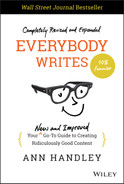36
Default to the Present Tense
Write in the present tense as much as you can. The easiest, most direct, strongest form of a verb is its present tense:
Just do it.
Look at what happens when we rewrite that using conditional tense:
You would just do it.
Or future tense:
You will just do it.
Or past-perfect continuous tense:
I have been just doing it since feet were invented.
See what's happening in your brain? Your brain now is trying to clear those qualifiers and conditionals like hurdles on a reading racetrack. (One sponsored by Nike?)
Text written in the present tense is more clear, direct, and immediate. It feels less complicated.
I know I'm cheating a little bit with that Nike example. Verbs come in three tenses—past, present, and future—to tell us when things happened/are happening/will happen.
I hear the principled pedant in the back of the room, waving their hand in the air with a question.… “Am I suggesting we time-travel? That we bend time to our own will?”
No, my principled friend.
Instead I'm suggesting that you look to the present tense as a default, when it makes sense to do so.
Two approaches:
- Can you rewrite in the present tense and not change meaning too much?
- Instead of: Zero-party data has changed everything about collecting vital marketing data. (present-perfect tense)
Try: Zero-party data changes everything about collecting vital marketing data. (present tense)
Why this works: The second version is both shorter and more direct. Swapping “changes” for “has changed” changes the meaning slightly, but not enough to make a difference overall.
- Instead of: We have noticed that four-day workdays have become a standard perk, more prevalent than the foosball table and on-site dry cleaning.
Try: Four-day workdays are now a standard perk, more prevalent than the foosball table and on-site dry cleaning.
Why this works: The shorter version of this sentence eliminates the wasted words at the beginning of that sentence (we have noticed), and makes the action more immediate. Shorter workdays are a perk. Full stop.
- Instead of: Our research showed that 60% of us love an airport massage.
Try: Our research shows that 60% of us love an airport massage.
Why this works: Is the research current and still relevant? Then it's fine to say it actively shows even if the actual research happened in the past.
- Instead of: Zero-party data has changed everything about collecting vital marketing data. (present-perfect tense)
- If the present tense doesn't work, use the simplest version of a verb you can.
- Instead of: The Morton Salt Umbrella Girl was created as a mascot for Morton Salt in 1914.
Try: Morton Salt created the Morton Salt Umbrella Girl as a mascot in 1914.
Why this works: The first version uses the passive “was created.” The second uses a simpler active verb.
- Instead of: She was redesigned several times over 100 years. Each time, her outfit would become more on-trend.
Try: Morton redesigned her several times over 100 years. Each time, her outfit became more on-trend.
Why this works: Again, we're swapping the passive voice (“was redesigned”) for active (“designed”). We're also simplifying “would become” by subbing “became.”
- Instead of: The Morton Salt Umbrella Girl was created as a mascot for Morton Salt in 1914.
